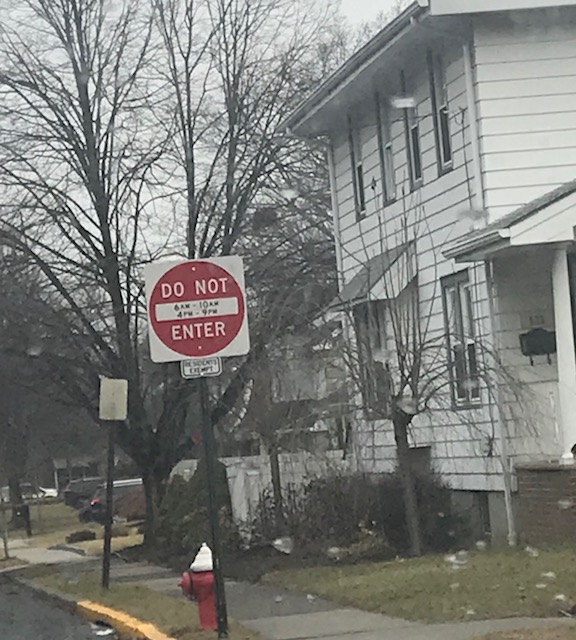
[slideshow_deploy id=’899′]
BY MICHAEL OLOHAN
OF NORTHERN VALLEY PRESS
Englewood, New Jersey — Dozens of disgruntled Englewood residents waited on line at the Feb. 20 city council meeting to criticize Leonia’s month-old road closures directly to Mayor Judah Zeigler, some imploring him to end the closures and let residents travel freely between towns.
Zeigler sat at a front table, took lots of notes, and listened patiently as an hour-long parade of neighbors spoke. Several times, Council President Wayne Hamer asked residents to address him and not Zeigler.
While addressing complaints, he noted Fort Lee appeared “happy” with reduced traffic on its streets, while Teaneck and Palisades Park had “no issues” with the 60 street closures enacted by Leonia to reduce traffic traversing the borough on its way to and from the George Washington Bridge.
The street closures were enacted Jan. 22 for nine hours per day, seven days per week, from 6-10 a.m. and 4 p.m to 9 p.m.
Zeigler said no $200 summonses for violating the closures had been issued by Leonia police since the closures began.
Opposed to closures
“Nothing short of eliminating Leonia’s ban on 60 streets, nine hours a day, seven days per week is what we stand for. Leonia chose to stand alone. We cannot stand with them. These are public streets—this is not a private gated community with border patrol,” said Diane Jansen, Ridgeland Terrace.
Stephanie Harper, Overlook Place, said there is a “safety issue” with streets blocked off.
“Diplomacy works. It would have been wise to attend a city council meeting prior to blocking us from using public streets. Showing proper respect to everyone is always very important,” she told Zeigler.
Another Ridgeland Terrace resident, Pete Jansen, provided council a petition signed by 50 residents. He read the petition that said “the roadblock is discriminatory, infringes on our civil rights and enables police targeting.”
“You are losing my business and my clients are also complaining that it is taking them longer to get to my place of business,” said Gayle Lewis, Maple Street.
“I implore you for your businesses and your neighboring town, please remove the roadblocks,” she said.
Jan Anderson, Ridgeland Terrace, said she “failed to understand what kind of communication” occurred to inform Englewood about road closures.
“This doesn’t seem very respectful to me,” she added, referring to the closures.
Angelina Rivera, Ridgeland Terrace, said she was “stopped and questioned three times” by Leonia police.
“Fearing that we can get a $200 ticket just making a right on our own street is ridiculous,” she said.
Rivera said Ridgeland Terrace borders Leonia, and she spoke to others who border Fort Lee and Palisades Park.
“Same issues daily, weekly—it’s not fair and it’s not right,” she said.
“We cannot close streets to anybody,” said former Mayor Sondra Greenberg.
Lisa Wisotsky, Hutchinson Road, urged the council to file suit against Leonia for closing streets. She said state transportation aid is given to Leonia for street repairs.
“How can state funding be used for what’s essentially private roads?” she asked. She noted the Leonia ordinance closing streets “invites selective enforcement.”
[slideshow_deploy id=’899′]
Mayor defends closures
Leonia Mayor Judah Zeigler said 4,000 vehicles use Fort Lee Road daily and that increases to 12,000 vehicles when traffic jams occur at the George Washington Bridge.
He said closing 60 local roads was “never about reducing traffic. The goal was simply to redirect traffic to our main thoroughfares.” He blamed traffic apps like Waze and Google for redirecting cars through Leonia’s narrow streets when traffic congestion occurs at the bridge.
An ‘extreme measure’
He said Chief of Police Thomas Rowe studied the issue and a “significant increase” in pedestrian and motor vehicle incidents “became a public safety concern” leading to the ordinance closing streets.
“This is absolutely an extreme measure. We really feel we had no choice but to do this.” He said “a lot of misinformation” has been spread about the closures, including that people are banned from roads, or a so-called border patrol exists. He said neither was true.
“We are trying to fix the problem and not just the symptom. We really feel we had no choice,” he said. He said Leonia was “making progress but at a snail’s pace” with Port Authority and not yet able to meet with the City of New York to discuss traffic issues.
A big mistake
Zeigler referred frequently to his notes, and admitted to a “big mistake.”
“We used the wrong signage. The ‘Do Not Enter’ signs are a big problem. They are overly foreboding. They are menacing and they cause massive confusion,” he said.
He said all signs would be replaced with black and white signs that more clearly explain the street restrictions.
He also offered to visit Ridgeland Terrace, where many residents complained about the restrictions.
“Their concerns seemed very valid to me,” he said.
He said as “unintended consequences” become clearer, closure hours may need to be adjusted. “It’s meant to be an iterative process. If changes need to be made we’ll make them.”
He advised several people who mentioned possible racist motives related to police stops to go directly to the state attorney general’s office and file a complaint. “They have protocols to address it. It’s not tolerated in Leonia,” Zeigler said.
He said Leonia police are only checking for [residential] hangtags if they stop someone to enforce Leonia’s road closure ordinance.
Zeigler said Mayor Frank Huttle III “very strongly expressed the concerns of residents” to him since the closures began. He said “communication was handled by the police department” to notify area police departments of road closures, and local mayors were not notified.
“I encourage you to reach out to me directly,” Zeigler said. “I didn’t come here to change minds, I came here to hear your concerns…we’re looking forward to working together to resolve any issues,” he added.
